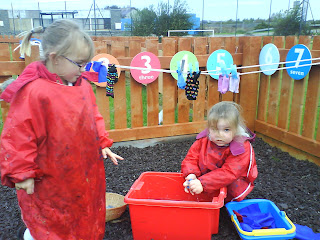 The
Foundation Phase is an approach to learning which is for children between the
ages of 3 and 7 in Wales. It is the compulsory curriculum in Wales for all
children between the ages of 3 and 7 in both maintained and non maintained
provisions that are funded for education by the Local Education Authority. The
foundation phase places a great importance on children learning by doing rather
than sitting in a classroom. The foundation phase also gives young children the
opportunity to gain first hand experiences through play and active involvement
rather than sitting in a classroom completing exercises in books and learning
off the board. By learning through hands on experiences this gives the children
time to develop their listening and speaking skills which will enable them to
become more confident when they are writing and reading. This is to develop the
children’s knowledge, skills and understanding through play, practical
learning, and by solving real life problems in both the indoor and outdoor
environments through these areas of learning.
The
Foundation Phase is an approach to learning which is for children between the
ages of 3 and 7 in Wales. It is the compulsory curriculum in Wales for all
children between the ages of 3 and 7 in both maintained and non maintained
provisions that are funded for education by the Local Education Authority. The
foundation phase places a great importance on children learning by doing rather
than sitting in a classroom. The foundation phase also gives young children the
opportunity to gain first hand experiences through play and active involvement
rather than sitting in a classroom completing exercises in books and learning
off the board. By learning through hands on experiences this gives the children
time to develop their listening and speaking skills which will enable them to
become more confident when they are writing and reading. This is to develop the
children’s knowledge, skills and understanding through play, practical
learning, and by solving real life problems in both the indoor and outdoor
environments through these areas of learning. 
Within the foundation phase there is framework which sets out the curriculum under the seven areas of learning. These seven areas are Personal and Social Wellbeing, And Cultural Diversity, Physical Development, Creative Development, Language, Literacy and Communication Skills, Welsh Language Development, Mathematical Development, Knowledge and Understanding the world.
1)Personal and Social Wellbeing and
Cultural Diversity explores experimental learning in which activities take
place inside and outside of the classroom aiming to find the advantages of
this. This also helps children to understand other peers’ cultures and builds
confidence and which also builds on their self esteem. Whilst doing this it
builds relationships with other individuals who allow them to explore and
understand other people’s feelings.
2)Language, Literacy and
Communication Skills discusses how children in Wales live in a bilingual
society and explores the difficulties that come along with this. Also In this
element of the foundation phase communication is the key when children are
encouraged to talk about their emotions in order to sort out any problems that
they may be having. Children here are encouraged to listen and answer to others
and make choices through a variety of different Medias.
3)Mathematical
Development is helping children develop their skills by oral and practical and
play activities. This is by using a more formal method as the development
increases.
4)Welsh
Language Development is where the children are more and more exposed to the
welsh language. It ensures that welsh language carries on to the next age
groups to come. This can help to encourage feelings of belonging and a sense or
heritage. It can also help to support an understanding of the welsh culture.
5)Knowledge and Understanding of the World is where the child should
experience the world by learning for themselves by investigating indoor and
outdoor environments. All children have curiosity about the world that we live
in so this area of learning helps children explore using their imagination and
through play. The children will be given experiences that increase their
curiosity in which they then begin to understand the world we live in which
enables them to demonstrate care, responsibility, concern and respect.
7)Creative Development is where the children will practise and explore the designing area of education which includes the subjects arts and dance.
Reference;
http://wales.gov.uk/topics/educationandskills/earlyyearshome/foundation_phase/?lang=en
http://wales.gov.uk/topics/educationandskills/earlyyearshome/foundation_phase/eval/;jsessionid=E83A09DF35FD4C9C0228C93ED131BC51?lang=en
http://wales.gov.uk/topics/educationandskills/earlyyearshome/foundation_phase/foundationphasepractitioners/frameworkchildlearning/?lang=en

No comments:
Post a Comment